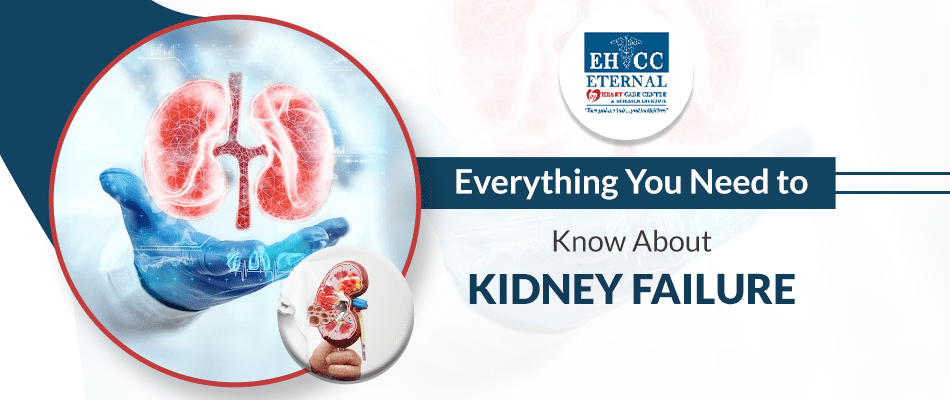
Everything You Need to Know About Kidney Failure
Introduction
Kidney failure, a serious health condition, affects millions globally. It is also known as renal failure and is a serious medical condition that can have life-altering implications. This blog will provide an in-depth understanding of its types, symptoms, early signs, how do you know kidney problems, and treatment options. Let’s explore this critical issue together.
Understanding kidney failure
Before we explore kidney failure specifics, it’s imperative to understand the role of the kidneys in our bodies. The kidneys filter out waste products, excess nutrients, and fluids from the bloodstream. These are then excreted from the body in urine. When the kidneys cannot perform this function effectively, kidney failure results.
It occurs when the kidneys, two bean-shaped organs located on either side of the spine, lose their ability to filter out waste and excess fluids from the blood. If this occurs, harmful waste can build up in the body, resulting in health problems.
Types of kidney failure
Kidney failure can be classified into two main types:
- Acute kidney injury (AKI).
AKI is characterized by a rapid loss of kidney function over a short period – usually within a few hours or days. This type of kidney failure is often reversible if treated promptly and appropriately. Causes of AKI can include severe infections, certain medications, or a blockage in the urinary tract.
- Chronic kidney disease (CKD).
CKD is a long-term condition in which the kidneys gradually lose their ability to function. Unlike AKI, CKD damage is often permanent and can lead to end-stage renal disease (ESRD), where dialysis or a kidney transplant is necessary to sustain life. CKD causes include high blood pressure and diabetes.
The symptoms of kidney failure
A variety of conditions can cause kidney failure symptoms, which vary greatly from person to person. Among them are:
- General fatigue and illness
- Confused or having difficulty concentrating
- Weight loss and loss of appetite
- The problem of insomnia and other sleep disorders
- An increase in swelling in the legs, ankles, and feet as a result of fluid retention
- Itching and dry skin that persists
- Breathing difficulties
- If fluid builds up around the heart lining, it can cause chest pain
Signs of kidney failure at an early stage
Changes in urination: This can include an increase or decrease in frequency, the presence of blood in the urine, or a change in the color or consistency of the urine.
- Swelling in the legs, ankles, and feet: This is caused by the kidneys’ inability to remove excess fluid from the body.
- High blood pressure: The kidneys regulate blood pressure. Damage to the kidneys can result in high blood pressure, which in turn can cause further damage to the kidneys.
- Fatigue and weakness: Healthy kidneys produce a hormone called erythropoietin, which signals the body to make red blood cells. When the kidneys are damaged, they may not make enough of this hormone. This may lead to a decrease in red blood cells and result in fatigue and weakness.
- Loss of appetite: This can be due to a build-up of toxins in the body that are normally removed by the kidneys.
Kidney Failure: Urine color
One of the earliest and most noticeable signs of kidney failure is changes in the color and consistency of urine. Healthy urine is pale yellow and clear. In kidney failure, the urine may become dark yellow, brown, or even red if blood is present. It may also appear foamy or bubbly due to excess protein.
Chronic kidney disease stages
Chronic kidney disease progresses through five stages, each representing a different kidney function level. These stages are determined by the glomerular filtration rate (GFR), which measures how well the kidneys filter waste from the blood.
Stage 1: Kidney damage with a normal or high GFR (90 or above). Kidney function is considered normal, but kidney damage has been detected.
Stage 2: Kidney damage with mildly decreased GFR (60 to 89). At this stage, some minor loss of kidney function has occurred.
Stage 3: Moderately decreased GFR (30 to 59). This stage indicates moderate to severe kidney damage.
Stage 4: Severely decreased GFR (15 to 29). Kidney function has declined to the point where kidney disease complications are likely to occur.
Stage 5: Kidney failure, also known as end-stage renal disease (ESRD), with a GFR less than 15. At this stage, dialysis or kidney transplants are necessary to sustain life.
Treatment Options for Kidney Failure
Kidney failure treatment depends on the cause, the individual’s overall health, and the severity of the disease. Treatment options include:
- Lifestyle changes: This can include dietary modifications, regular exercise, and quitting smoking.
- Medications: These can help manage symptoms and slow disease progression.
- Dialysis: This treatment filters and purifies the blood using a machine. This helps to keep your body in balance when the kidneys can’t work.
- Kidney transplant: This involves replacing the diseased kidney with a healthy one from a donor.
Conclusion
Kidney failure is a serious medical condition that requires prompt attention and treatment. If you or a loved one are experiencing any symptoms or signs of kidney problems, it’s imperative to seek medical help right away. With early detection and appropriate treatments, you should consult the Best Urologist In Jaipur. Dr Sandeep Nunia is the best Urology doctor in Jaipur. He has years of experience and is the highest-ranking Urologist in Jaipur for treating ailments such as Laparoscopic treatment, Female Urology, Sexology treatment, Uro Oncology, and Kidney stone treatment.